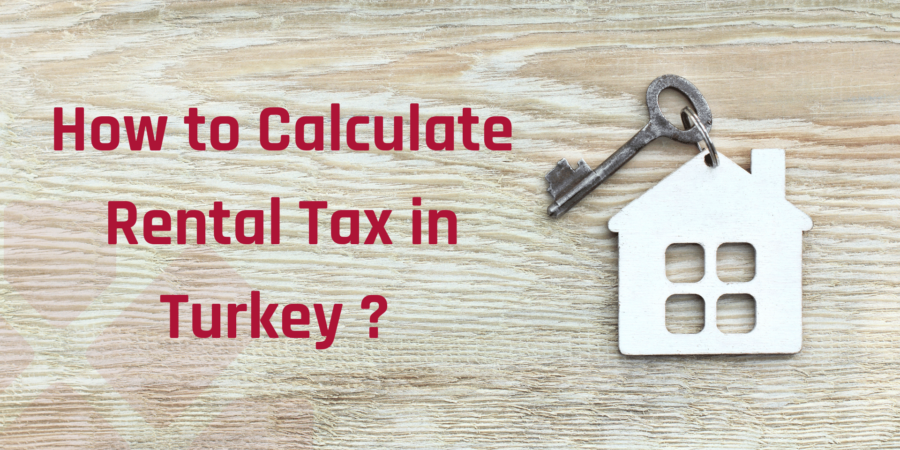Many people choose to buy property in Turkey. Some do it to support an immigration application, others do it, so they have a residence when they visit, and some do it as an income property. They rent their property long or short term and make money from tenants.
Like most places, the income you earn from the property you own in subject to rental income tax in Turkey. Here’s what you need to know.

Income Taxes in Turkey
Like most countries, Turkey has a progressive income tax system. This means that the tax percentage you pay is based on your earnings. The more you earn, the higher the percentage.
Income tax in Turkey starts at a rate of 15% and goes up to 40% for the highest earners. Real estate income in Turkey is part of the earnings calculation, and the more you make, the more you will have to pay in taxes. The current tax percentages are as follows:
The good news is that if you aren’t a resident of Turkey (which means you don’t live in the country for more than half of any year), you only have to pay tax on your income in Turkey. So your taxes won’t be calculated on your global earnings.

Property Tax in Turkey
As a property owner in Turkey, there are several things you need to know about rental income tax, and several kinds of taxes that might apply to your situation. Let’s take a closer look:
Tax on Property Income in Turkey
If you own property in Turkey and you earn rental income from it, you are legally obligated to file an annual regular income rent statement.
This applies to domestic and commercial rentals, so it does not matter if your renters live in the property or work there.
The rental income period that applies to your rental income Tax is from 1 March to 25 March the next year. You must file your income statement at the end of that period, and the first installment of the taxes due on the rental must be paid on the 31st of March, and the second in July.
If you plan to travel during the period that your rental income tax statement and payment will be due, you must file and pay your taxes on rental property 15 days before you leave. If you have inherited a rental property, you have until 4 months after the original owner died to file your rental income tax.
Rental income tax statements can be filed in person at tax centers in Turkey, or you can file them online. The documents are also available on the Turkish tax authority website, and they make it quite simple to calculate income, deduct expenses and calculate your taxable income from property.
Rental income tax can be paid at tax offices and at any bank in Turkey. It’s very easy, but make sure that you don’t miss the filing or payment deadlines, or you will be fined and penalized!
How to Calculate Rental Income Tax in Turkey ?
Like regular income tax, the tax on real estate rental income in Turkey is progressive. So, like other income tax, the more you make from your rental properties, the more you will pay in taxes.
The tax amounts can and often do change every year, so you should always double check what the current rates are, but right now, they are:
There is also a stamp duty that must be paid when you file your rental income tax, so be sure to factor that in. Also remember that you can deduct qualifying expenses from your rental income, so it is based on the net income, not the gross.
Real Estate Tax
In addition to tax on the rental income you earn in Turkey, you will need to pay property taxes on all the properties you own. These are set and collected by the local municipality, and vary from place to place, but they are usually somewhere between 0.1 and 0.6% of the assessed value of the property every year.
Be sure to find out what the property taxes on any property you buy will be before you make a purchase, so that you can factor this expense into your calculations.

Valuable Housing Tax
In 2019, Turkey introduced a new type of tax that might apply to your real estate income in Turkey.
Known as the Valuable Housing Tax, it was not implemented until 2020, but since then, an additional tax has been levied on properties that exceed a certain value. Currently, these taxes are:
- 3% on any amount over 5.25 million Turkish Lira, up to 7.87 million Turkish Lira
- 6% on any amount from 7.87 million Turkish Lira to 10.5 million Turkish Lira
- If you own a property valued at over 10.5 million Turkish Lira, you will be taxed a flat rate of 22,500 Turkish Lira, plus 1 percent of the value over 10.5 million Turkish Lira
These calculations are made based on the valuation of the property, and they are automatically due when you pay your taxes.
FAQ
The tax system in Turkey is not as complex as some, and there is a lot of information on the government website. You can also contact any local tax office for clarification if you’re not sure what you need to pay. Here are some common questions about rental income tax in Turkey:
What can you deduct from rental income tax in Turkey?
When you calculate your real estate income in Turkey, you can deduct for maintenance, wear and tear, insurance on the property, and property management fees, if you use a property management company. This will reduce the amount of rental income, and the taxes on rental property you have to pay.
How Do You Calculate Deductions?
There are two methods of calculating deductions from rental income tax in Turkey: the lump sum method and the actual expense method.
In the lump sum method, you would first deduct the annual exempt amount as determined by the tax authorities. Then you would deduct 15% from the remaining amount. Whatever is left is the amount you will pay tax on.
If you have incurred significant expenses, it’s a good idea to use the actual expense method. This works the same way, in that you deduct the exempt amount first, but then you deduct your actual expenses from the remaining balance. You will need to keep proof of your expenses if you plan to use this method.
What about short term rentals?
In 2018, Turkey changed the way they handle rental income tax for short term rentals. If you want to rent your property as a vacation property or short term rental, you must have a business license, and you will pay progressive business tax on your income from the property. There is an exempt amount, so if you earn below that amount, you are exempt from paying tax, but you still need to file a return.
Taxes on the sale and purchase of property
Whether you are buying property for rental or for your own use, you should know that there is a stamp duty of 2.2% due on the declared value of the sale. This is payable by both the buyer and the seller of the property, but it is a one time payment.
What about property taxes on non-rental property?
If you purchase a property in Turkey that you won’t be renting, and that you intend to use as your residence or place of business, you won’t be earning a rental income, so you won’t have to pay tax on rental income. However, you will still need to pay stamp duties and annual property tax.
What about capital gains tax?
If you sell an income property in Turkey, you will also have to pay capital gains tax on the property. This is a tax on the difference between what you bought the property for, and what you sold it for. Be sure to ask the realtor or lawyer who handles the sale what you will be expected to pay on the property.
What if tenants pay their rent in cash?
If your tenants pay their rent in cash, you still have to declare it as income, and you still have to pay any rental income taxes that apply. If you are caught attempting to evade taxes on your rental property, you could be fined an additional 5% of the rent, and if your tenant was complicit, they could be fined too.





Comments: 6
Good way of describing, and nice article to get facts concerning my presentation subject, which i am
going to deliver in college.
First off I want to say excellent blog! I had a quick question which I’d
like to ask if you don’t mind. I was interested to find out how you center yourself and clear your head before writing.
I’ve had trouble clearing my mind in getting my ideas out.
I do take pleasure in writing however it just seems like the first 10 to 15 minutes are generally wasted just trying to figure out how to begin. Any suggestions or hints?
Cheers!
Hello to every one, the contents existing at this site are truly amazing for people knowledge, well, keep up the
good work fellows.
When someone writes an article he/she maintains the thought of a user in his/her mind that how a
user can understand it. Therefore that’s why this piece of writing is great.
Thanks!
Hello I am so glad I found your blog, I really found you by accident,
while I was looking on Yahoo for something else, Regardless I am here
now and would just like to say kudos for a tremendous post and a
all round thrilling blog (I also love the theme/design), I
don’t have time to go through it all at the moment but I have
book-marked it and also added in your RSS feeds, so when I have time I
will be back to read much more, Please do keep up the
excellent work.
I know this web page offers quality depending articles and extra stuff, is there any other website which provides such stuff in quality?